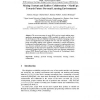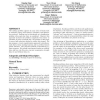853 search results - page 36 / 171 » Dyslexia and learning computer programming |
156
click to vote
ICALP
2011
Springer
14 years 3 months ago
2011
Springer
We give new algorithms for a variety of randomly-generated instances of computational problems using a linearization technique that reduces to solving a system of linear equations...
102
Voted
DIGITEL
2007
IEEE
15 years 6 months ago
2007
IEEE
Distributed Computational Toys are physical artifacts that function based on the coordination of more than one computing device. Often, these toys take the form of a microcontroll...
105
click to vote
HCI
2009
14 years 10 months ago
2009
The recent movement by major Web services towards making many application programming interfaces (APIs) available for public use has led to the development of the new MashUp techno...
93
Voted
AAAI
2011
14 years 14 days ago
2011
We propose a fast batch learning method for linearchain Conditional Random Fields (CRFs) based on Newton-CG methods. Newton-CG methods are a variant of Newton method for high-dime...
116
Voted
ACMSE
2010
ACM
14 years 7 months ago
2010
ACM
The ranking problem appears in many areas of study such as customer rating, social science, economics, and information retrieval. Ranking can be formulated as a classification pro...


